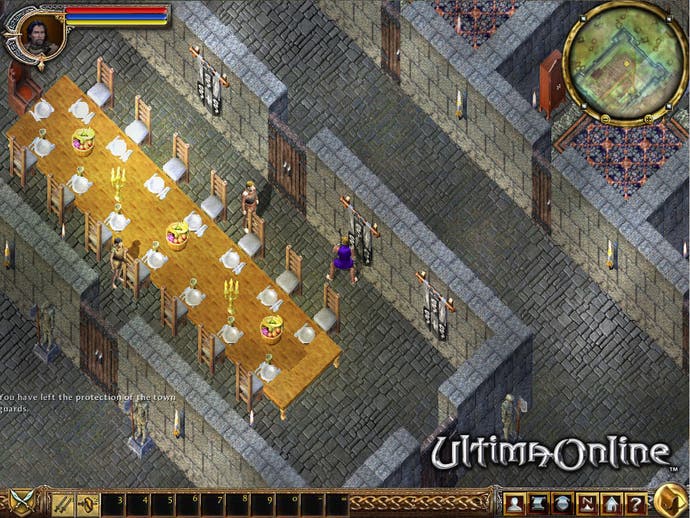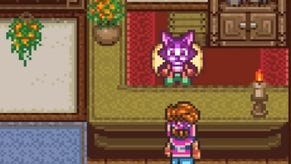Ultima Online
Kingdom revisited.
It's always the maze that gets me. Though its appeal has waned somewhat after each subsequent visit, I still hold fond memories of meandering through a seemingly endless tangle of forest and shrubbery - darting past an ettin, a gargoyle, and perhaps less thrillingly, a mongbat - and finding myself at the entrance of a giant hedge labyrinth. Supposedly constructed by the wizard Relvinian with a view to getting daemons to do his laundry, it's a calming, floral little place whose only real perils are the odd troll-under-the-bridge and the nimbus of hellspawn living at its core. It's not tied to any particular quest I know of; it's just sitting there, waiting to be discovered.
That's the Ultima Online I remember: so different to the modern MMO model that it's almost a distinct genre. Where your City of Lord of the Warcrafts like to lay their landscapes out in a linear, tiered fashion - there's room at the top-level dungeons they're telling you still, but first you must learn how to smile as you kill fire beetles - UO presented its virtual Britannia just as it had appeared in offline Ultima games: open, detailed, and deeply interactive. It was a tribute to Raph Koster's masterful game design that the utterly mundane - fishing, tailoring, carpentry - became not only addictive, but a viable in-game career- or power-path. You were just as likely to see a grandmaster woodchopper's waterfront castle as you were a more common-or-garden dragonslayer's.
The little discoveries, the player-built and player-governed towns, even the highway muggings - all served to create a game that felt more World than Warcraft. Of course, as so much of UO's appeal was player- rather than content-driven, and as UO's population has more than halved since its 250,000 peak in 2003, it stands to reason that the experience has changed somewhat. Indeed, when I logged on for the first time in years, I was half-expecting a wasteland. But while the server I chose wasn't exactly Times Square at midday, I was never too far from a fellow adventurer.

The immediately apparent changes come instead from EA's new Ultima Online client. The Kingdom Reborn client, released in 2007, is an effective compromise between the stalwart 1997 2D version of UO, and the unloved 2001 3D one - spells and effects are rendered with all the beauty a modern graphics card can afford, whilst the environments and characters are highly-detailed sprites. The effect is eerily similar to a higher-fantasy vision of Diablo II, but that's hardly a criticism. With the smooth scrolling and zoom feature the new engine affords, it's pretty enough to stand up against many of its contemporaries, and has a nice quality-to-performance ratio that, theoretically, is highly appealing to the WOW-playing mainstream.
I say theoretically, because Kingdom Reborn seems to have had little effect on UO's steadily shrinking userbase. And despite the obvious player consensus that Kingdom Reborn looks nicer than its older counterpart (the 3D client has been discontinued), there's been some negative commentary regarding its functionality and reliability. The group of players with whom I ran through UO's newbie dungeon, Despise, had all tried KR but quickly abandoned it, citing crashes, lock-ups, and general degraded performance.

More interesting are the subtle ways KR changes the experience of being a new player. There's the somewhat anaemic New Player Tutorial, which has led to such epic feats as Alec Meer's The Worst Ninja series. There's the beginner town of New Haven, which was released more-or-less concurrently with KR, and, there's a new interface with a much more sensible and customisable map system.
As Meer has commented, none of these exactly flatten the learning curve, but compared to days-gone-by UO it's tantamount to spoon-feeding. So much so, in fact, that I can't help but feel wistful, in a masochistic kind of way, for the days when being ganked and looted meant a long-but-noble climb back up the ladder - for the solo player who always forgot to store stuff in the bank, anyway. Newly naked but for the tatty ghost-robe covering my my modesty, I would steal crops and chop every tree in sight to earn cash, turning Richard Garriott's idyllic little slice of Anglophilia into a barren Tokyopolis.







